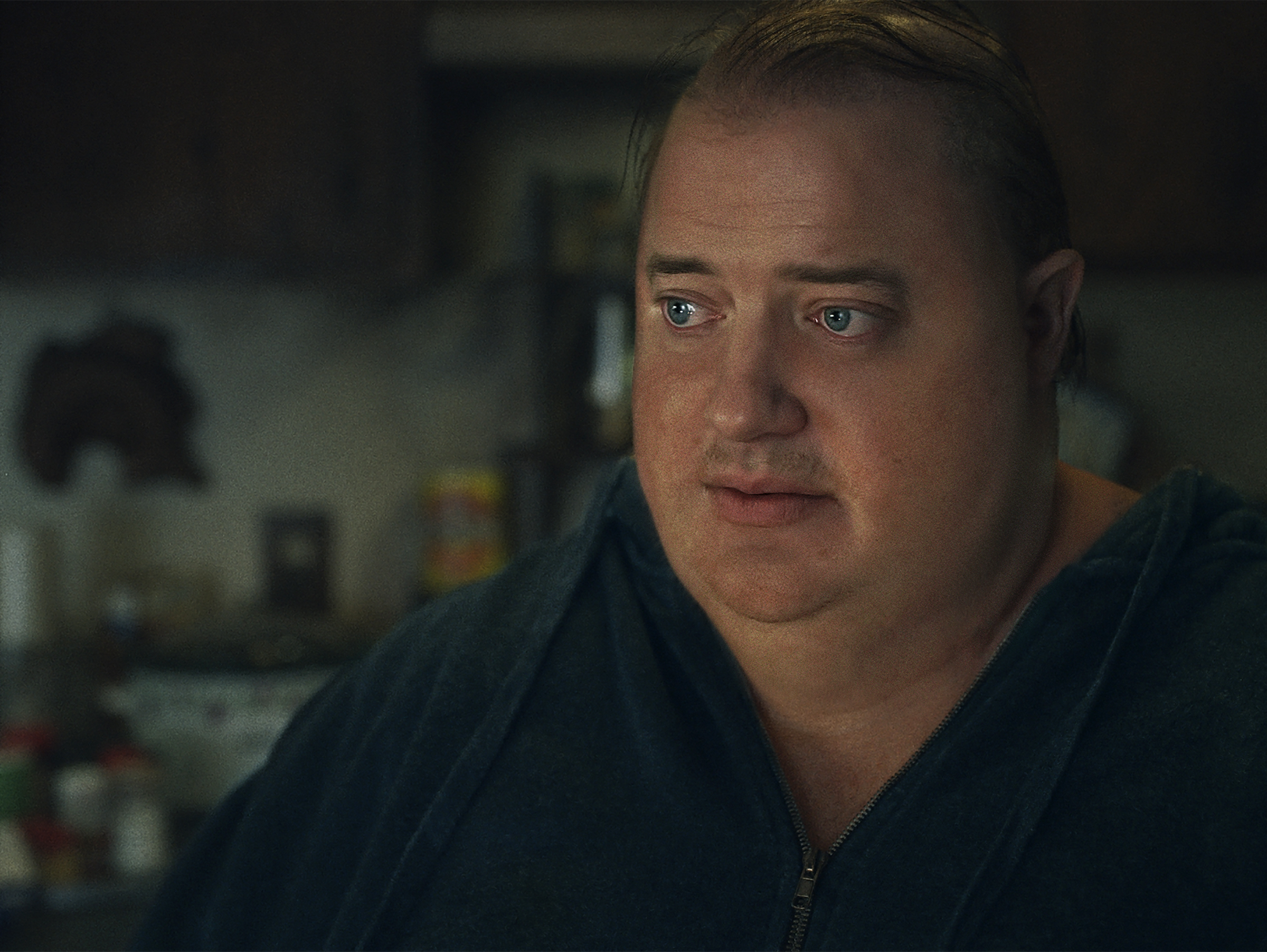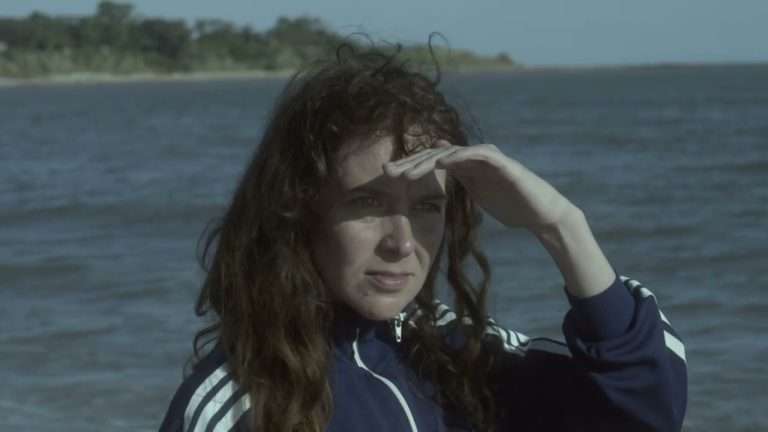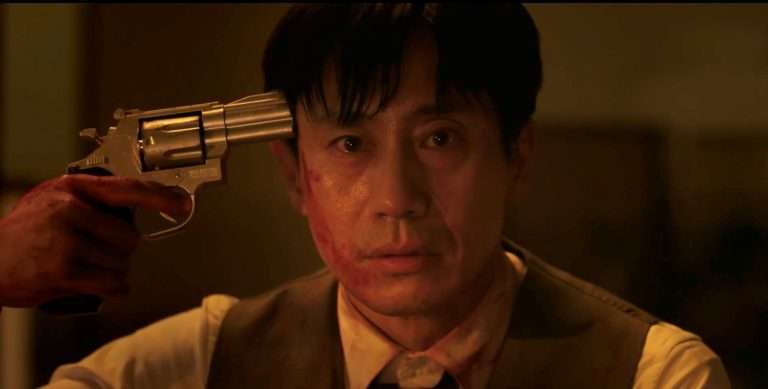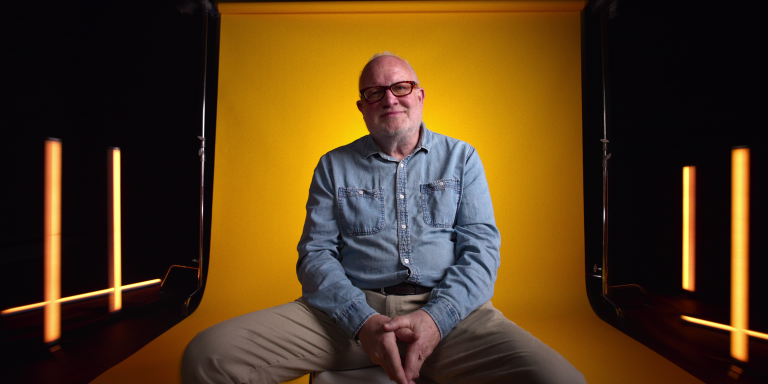The Whale (2022) Movie Explained: Ending & Themes Analyzed: Aronofsky’s latest tormenting creation has the innate sense of a murmuring, refractory observation than a purposive nudge towards contemplation. All we see of the magnificent Brandon Fraser’s agonized lead is all he sees of himself in every perversive moment of self-reflection. There is seldom a lot going on behind those bulging eyes of the morbidly obese man that isn’t intently limpid to us at all times. In every harrowing second of The Whale’s duration, Charlie’s self-devastating passage and the unrelenting need for mending the only thing that isn’t hopelessly wrecked yet, are synchronous with everything we are to grotesquely perceive as intrusive guests in his dreary home
The director’s auteurist extravagance stays steady on top of every bit of unsettling indulgences of Charlie that we are made to endure in a brazen exhibition. Yet, there’s always something that is invariably true of Darren Aronofsky’s almost scarring psychosomatic enterprises. The maximalist surveillance of his dejected leads doesn’t take anything away from the lingering dread we’re supposed to feel for their plight. Samuel D. Hunter’s thespian script denudes throbbing memories from the playwright’s life. The Whale emerges as a strikingly aggravating tale that will not be forgotten anytime soon, bearing aching experiences spasming with the induced pain that Charlie’s character has been sanctioned.
The Whale (2022) Plot Summary and Movie Synopsis
There’s an unfaltering sense of guilt as the perspective turns from a laptop screen with the blithe faces of Charlie’s students to his face that he would rather hide with an excuse of a faulty camera. From his dimly lit room that reeks of a persistent state of misery, Charlie teaches an online course on writing. Existing in a morbidly obese physique, Charlie is practically immobile without a walking aid. This airlessly desolated life of his hauls the somber memories of Charlie severing ties with his wife Mary and granting his eight years old daughter Ellie the trauma of being abandoned by her father.
It’s been nine tumultuous years since Charlie has done the thing that he regrets every waking moment of his forlorn existence. The time in between has bedecked Charlie’s life with an elusive experience of love, the cost of which he mournfully pays to this day by eating his way to death.
The First Discernible Sign Of An Impending Death
A foreseen heart attack during a languid moment of self-pleasure places the intrusive Christian missionary Thomas in charge of ensuring Charlie’s survival. Being barred from calling 911, panicky Thomas follows the wheezing man’s request and mumbles the lines from an essay on Moby Dick. We aren’t yet allowed to know the identity of whoever wrote the essay. What we do know is that Charlie is soothed by the thoughts of originality protruding from the lines that found Melville’s novel’s long-drawn passages describing the whale to be tedious. This is the originality that Charlie implores his students to tap into in their essays.
A Slowburn Suicide
Thomas is relieved of his duty when Charlie’s sole caregiver Liz takes over. Ailed with a heart that is ready to be laid to eternal rest, Charlie has chosen a slow death for himself. Liz alerts him of his dangerously high blood pressure that needs immediate medical attention, but as she glumly cedes a bucket of fried chicken to Charlie, she is aware that he doesn’t wish to be saved.
The gnarly imagery of his unsightly eating disorder, however disturbing and true of the wounded man, isn’t all that Charlie is. A man warm with every word of comfort he speaks–steadfast with his demand of originality from his students–is also a man afflicted to his very core with an unfixable, suicidal addiction to food. It is something that he has chosen to muffle his agony with. It is also something that he is bound to punish himself with to the extent of an untimely death.
The Whale (2022) Themes Analyzed
Love In The Absence Of Hope
From the alarming get-go, Liz is shown to be gifted with the soothing attributes of patience and care. She is also a cutthroat truth-teller who doesn’t shy away from telling off Thomas, who waves his pathetic New Life pamphlets in the face of the miserable man who he wishes to save with the words of a forgiving God. Without an exhaustive understanding of their past, Liz’s repetitive submissions to Charlie’s self-destructive urge to stuff his face baffles our puzzled minds.
How achingly she cares about Charlie is also undeniably evident from her gasping manner of performing Heimlich on him as he chokes on the meatball sub she has just given him. Liz accepts the severe truth that she can’t save Charlie from the thorny path that he will soon be walking for the last time in his aggrieved life. She repeatedly reminds him that he will die soon and buries her urge to grab him by his shoulders and scream, “stop killing yourself.” In her scornful leer at the fundamentalist church’s flagbearer Thomas, we see a viciously wounded Liz who couldn’t save her brother.
Liz had stopped kneeling to God when she was 12. At the same time, her brother Alan fell even deeper into the insatiable, bottomless well of faith that commanded a complete rejection of his very reality. He was kept from coming back home from his missionary duties in South America by a fanatical Christian father who arranged his marriage with a girl from New Life. Even when he did come back, lived his truth, and commenced a life of love and warmth with his partner Charlie, his father turned his back on him. Being shunned from all that he had weaved his life around was agonizing for Alan to withstand.
Liz helplessly saw her brother wither away from a voluntary withdrawal from food and water. Nothing she said, not one of her pleadings, could leave a mark on the battered heart of the man who soon walked into the ocean and became one with eternal oblivion. Liz has been mourning that shattering loss with the only other man who the same relentless march of grief has trampled. She has seen the will to endure slip away rapidly from Charlie’s hands. She can’t be an effective roadblock in his self-destructive path. All Liz can do is love Charlie and be there for him, if only to be paralyzed in her inability to save him and watch him perish.
The Scars Of Abandonment
It would be immaterial for Charlie and us alike to hope that the daughter he left behind when she was a child would not strike down his very late attempt at reaching out. Ellie is understandably hateful towards a father who left her to be with his student, and it is eruptive hate that everything around her gets subjected to. It is only when Charlie can practically see the grim reaper standing in the corner of his room, waiting to smite him with his scythe, that he tries to do one thing right before his time comes.
Mary has kept him from Ellie. It was a decision that didn’t emanate from her anger towards her ex-husband, who left to be with a man. It was, as Mary herself admits, her way of keeping Charlie from seeing the “evil” that Ellie is growing up to be. But evil isn’t what Charlie sees in 17-year-old Ellie. Even when she ruthlessly wounds him with her brutish words, all Charlie sees in Ellie is a wonderful daughter he is lucky to have spawned.

Even when Ellie bullies him into standing on his crumbling knees to walk to her, making him fall over the coffee table and wheeze to keep his heart going, Charlie thinks of her as a girl luminous inside and out. He promises her the fortune he has been saving up and even offers to ghostwrite her school essays to keep her from falling behind. All that, with a side of gasping pleadings, to make her keep coming back, for it’s his last chance to ascertain that he didn’t completely fail as a person.
Ellie’s vicious demeanor surpasses that of the usual angst of a teenager. She wears a spiky facade to fend off the world and hurt it before it can hurt her. The spiteful Ellie doesn’t mind asking a dying man to die already and even slipping him a couple of sleeping pills, knowing fully well the risks it can pose. And yet, Ellie keeps coming back. Granted, she does so when she is promised a load of money and help with her school work. But the girl with a photographic memory lingers on just a bit too long for someone who claims to be disgusted by her father. She bears the stinging words of approval that she is receiving a bit too late in her life.
The Blemishes In Heavenly Forgiveness
Screenwriter Hunter has written Charlie with all the tenderness derived from his own life as a closeted gay man in the bleak halls of an Idaho Christian missionary school. The rudimentary teachings of a faltering notion of God’s love have been given diligent treatment by Aronofsky, who is known not to be coy about anarchic explorations of faith in his films. The amusing and often bewilderingly obnoxious medium of the same in The Whale is the character of Thomas.
From the moment he laid eyes on Charlie’s haphazard state, he had set his mind on saving the poor guy. Nothing, not even repeated scoffs from Liz, keeps the obstinate missionary from repeatedly showing up with “literature” from his church. Thomas has made his life all about securing a “God’s child’s” journey to heaven. Only when Ellie gets the feeble soldier of God high on the pot does he bares his questionable relationship with faith.
The self-proclaimed bringer of salvation had stolen some petty cash from his church in Iowa. And he has been on the run ever since from the church and the family that is disappointed in him. Disturbingly reflective of the false face of tolerance that the people of the church are known to put up, Thomas strives not to openly gag at the thought of Charlie sharing his bed with a man.
Not only does he abuse the privileges of having access to Charlie’s home and gets his hand on Alan’s Bible, but he proceeds to do the unthinkable and reads aloud a highlighted passage to open Charlie’s eyes to the light of God with a blingy “homosexuality is a sin” lecture. Thomas’ painfully persistent drive to rid Charlie of his “sin” and “save” his tainted soul from his “blasphemous” body is a crippling reminder of the criminally catastrophic religious doctrine and the questionable “love” of God.
The Whale (2022): Ending Explained
How Does Charlie Make It Up To Ellie?
The Whale’s revelatory catalyst is Mary’s appearance in Charlie’s life. She isn’t necessarily fond of Charlie’s annoying tendency to put a positive spin on the direst of situations. At the same time, Mary misses how his irksome positivity is used to balance out her characteristic cynicism. When Liz shows up and is taken aback by the sudden sight of Mary, the latter doesn’t feel the need to cut back on her candor. Mary rightfully disapproves of Charlie’s decision to bequeath a massive sum to a disturbed teenager. This is also the first time Liz learns of the kind of money that Charlie has been saving. His only plaintive plea for the same is that the least he could do to make up for not being in Ellie’s life for nine years was to give her everything he possibly could.
Our minds swiftly turn back to the first scene when Charlie blames his barren bank account for not seeking medical help. We earnestly empathize with Liz, who is having a hard time coming to terms with the wretched truth that Charlie has been killing himself in more ways than one. Amongst the several absolutely irrefutable transgressions that Charlie has committed in his unforgiving life, being dishonest to Liz, the one friend who tirelessly deteriorated her physical and mental health to take care of him, must be an inexcusable one.
In The Whale, what we’ve essentially been taking a dreadful walkthrough is the last week in Charlie’s life. The closer he gets to acknowledging that his death, as foretold by Liz, is imminent, the less inclined Charlie is to hide himself from the world. When his crude message on the wall imploring students to write from their hearts gets him fired, he concludes his last session after finally showing his face to his students. His insistence on originality did strike a chord with a student who wrote, “I think I need to accept that my life isn’t going to be very exciting,” which also is an endearing remembrance of something one of Hunter’s students once wrote.
When Ellie comes back furious to have failed her test after submitting the essay that her father wrote, Charlie asks her to take a look at the essay. Looking through it, Ellie recognizes it as the essay on Moby Dick she wrote as a child. It is Ellie’s authentic words that Charlie holds on to in his worst moments, suffocated with agony.
What he believes of Ellie is what he, at the end of the day, wishes for her to be. Looking at her as she is about to walk out of the door, Charlie takes his last steps up from the couch. Lifting the behemoth burden of his many misdeeds, Charlie stands tall for his little daughter while completely aware that his heart will give out. He keeps muttering words of approval and affection that he wishes to inscribe in Ellie’s wounded heart. With tears in her eyes, Ellie looks at her father and watches his abused heart surrender.
Aronofsky’s peculiarly elysian delineation of Charlie’s ascension to heaven is the surreal stream of light that heaves a smiling Charlie from the earth. It wasn’t Thomas’ parochial God who could save him. It was only through making his amends to his daughter that Charlie could achieve redemption. And his heaven is the memory of the beach trip that he once took with Ellie. That was the last time he took a swim. That was also the last time he saw his daughter smile.





![Kill Me If You Dare Netflix [2019] Review: A rom-com that closely follows the blueprint](https://79468c92.delivery.rocketcdn.me/wp-content/uploads/2019/09/Kill-Me-If-you-Dare-Netflix-768x432.jpg)
